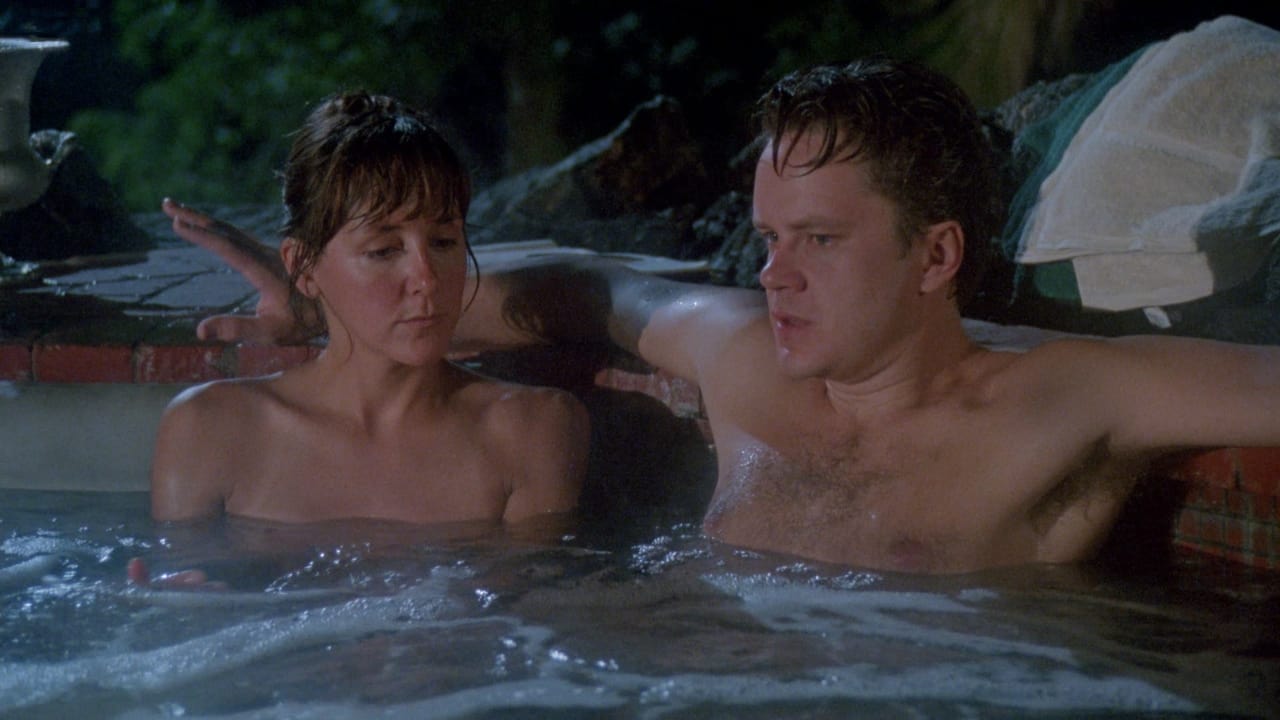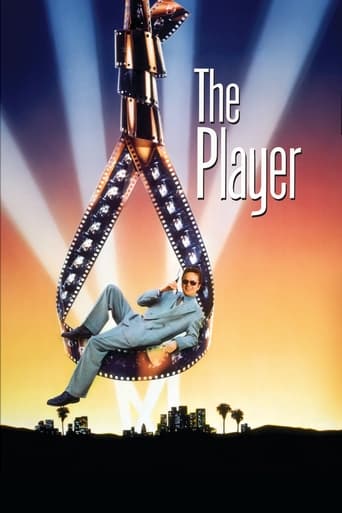

Robert Altman was a master filmmaker. Not everyone's cup of tea but if you like him I think you will enjoy The Player- a satirical take on the film industry. Starring Tim Robbins and a host of cameos (An Altman trait) the Player follows a studio executive's fight for survival after he accidently kills a screenwriter. Featuring some amazing sequences including an astonishing opening scene long take this film is one of the finest examples of Altman's wit and craftsmanship. The film wasn't a huge success upon release, but it is considered a great film now. I suggest you give this film a chance because this is auteur theory in tinsel town at its finest.
... View MoreRobert Altman's inside-Hollywood meta-comedy THE PLAYER is shot with a shoe-string budget but reverberates with sardonic, rapier-like kicks, and affixed with a chilling frisson that defies ethics and our expectation thanks to Michael Tolkin's trenchant script which brings Tinseltown's treacherous attributes to the forefront. Altman's much eulogized opening gambit, a nearly 8-minute long-take in the lot of a Hollywood studio, vocally pays tribute to Orson Welles' counterpart in TOUCH OF EVIL (1958), is a coup de maître to be rewinded and repeatedly viewed for its sheer coordination of the ensemble and the camera's agility in motion. Taking the center stage is Griffin Hill (Robbins), a young producer whose job is to listen to screenwriter's pitches of their ideas and to assess whether they are marketable enough to merit a go, and this producer-writer correlation is put under scrutiny as Griffin is dogged by anonymous, invective-scribed postcards, which he receives on a daily base, and after combing through telephone records, he gets the idea it is sent from David Kahane (D'Onofrio, bristling with ire and contempt), a bitter writer who might be rankled for receiving the short shrift. But gauging from Griffin's quotidian workload and the ratio of pitches he must disregard (the studio has a yearly quota of 12 to green-light), we don't get why Griffin is so sure it is David. Trying to bury the hatchet by renewing his interest in David's script set in Japan (Sofia Coppola's LOST IN TRANSLATION arrives a decade later in 2003), Griffin seeks him out and "accidentally" kills him when verbal vitriol escalating into physical violence, here Altman shrewdly predates the occurrence with Griffin calling David's home, and getting instantly bewitched by the latter's girlfriend June Gudmundsdottir (Scacchi), an Icelandic painter, under a voyeuristic spell. So whether the subsequent accident is a homicide or manslaughter, the answer is quite out there. The rest of story is against all odds, how Griffin gets away with the killing and lives happily ever after with June, does it sound like a joke? Yes, but the engagé Altman is in no fickle mood of maxing out Griffin's quagmire before the anti-climatic reveal: his current post is in a perilous state of being superseded by the new blood Larry Levy (Gallagher), a diligent detective (Lovett) breathes down his neck closely and the relationship with his colleague-cum-girlfriend Bonnie (Stevenson) turns sour as he courts June with tenacious guilt stuck in his throat, in the end of the day, he gets what he wants not what he deserves, and the final turnabout of the fictive movie starring Julia Roberts and Bruce Willis is such a slap in the face of those who harbor an airy-fairy ideology of retaining a writer's integrity in this rotten industry, only tempered by Altman's tongue-in-cheek mordancy that tactfully keep both industry insiders and outsiders entertained but not miffed, not to mention its effervescent star-spotingg game of umpteen celebrity cameos.Tom Robbins is the recipient of Cannes' BEST ACTOR award but unjustly fails to nab an Oscar nomination (the film per se is a 3-times nominee including a well-earned BEST DIRECTOR bid for Altman), who takes us through quite a rollercoaster ride with his portrait of Griffin par excellent, smirky, craven, vulnerable, besotted and careworn, all these facets are contributory to such degree of ambiguity that viewers are inwardly battling against their own conscience in terms of his denouement. Greta Scacchi is given a sizable role to send up the ostensibly exotic, free-spirited type (she might not even hail from Iceland) who just cannot say no to an opportunity of comfort and wealth like anyone else, and whose inner state is tellingly belied in their torrid love-making/confession-denial sequences, a fine achievement. Among the peripheral players, no one stands out significantly in the fray, except for a wisecracking Whoopi Goldberg, who duly earns her stripes with tart and hilarious comedy chops.In retrospect, THE PLAYER is a thrilling return-to-the-game comeback for Altman after his nadir in the 80s, and is among the most phenomenal works tackling the Hollywood hypocrisy and narrow-mindedness by lending an honest-to-goodness spin salted with tacit irony.
... View MoreRobert Altman is one of the rare American directors who have succeeded in keeping loyal to their own style and vision while also being able to carry on for quite a long time. Altman began directing in television in the 1950's, had his cinematic breakthroughs in the 1970's, and kept working hard until his death in 2006. He always kept a healthy distance to Hollywood, but it seems that he -- like so many others -- had a twofold relationship with the dream factory. The influence of classical Hollywood, which the director adored, is apparent in Altman's cinema, but at the same time he expresses great frustration and even loathe towards Hollywood. Both of these attitudes emerge powerfully in his witty, insightful, and lightweight satire of Hollywood, "The Player" (1992) which is filled with references to film history. The story focuses on a Hollywood studio executive, Griffin Mill (played by Tim Robbins) who starts to investigate an abandoned screenwriter sending death threats his way. After murdering the writer more or less unintentionally, Mill falls in love with the writer's girlfriend, but his new life is once again threatened by the police investigating the murder case. In the meantime, Mill's studio is producing a new film whose director wants something else than standard Hollywood entertainment, but the studio has different plans. The line between reality and unreality, fiction and non-fiction begins to blur as Mill's life starts bearing a resemblance to all those film-noir movies whose posters hang on the studio's walls. This is the core of the story to which Altman anchors all the multiple story elements that he enjoys developing. Inter-textual references, satirical jokes, and celebrity appearances might at times feel too much, though they all serve a purpose. The abundance of the film is fragmentary, but this episodic nature of the film does not need to be seen as a flaw, since Altman skillfully keeps it all together. To my mind, the beginning of the film nicely introduces Altman's stylistic program and summarizes this ability of his to keep many threads together. The film begins with a long tracking shot, recording the life inside a Hollywood studio from casual dialogue about movies to awkward pitching producers have to listen to, which seems like a direct reference to Orson Welles' "Touch of Evil" (1958) and its famous opening. Like this opening shot, the narrative of "The Player" is overall very self-aware; that is, the spectator is invited into taking the representation to account. One is often paying attention to the way things are structured rather than the things themselves. This might be at times alienating -- and intentionally so -- but Altman also strongly focalizes his narrative to the subjective point of view of his protagonist, enhancing the absurdity of the milieu and its surrounding events. All of these narrative elements serve Altman's purposes of criticizing Hollywood. His criticism, though stark and poignant, is hardly hostile, however. Overall, "The Player" is a veritably lightweight film in the sense that it doesn't have the emotional heaviness of "3 Women" (1977) nor the structural complexity of "Nashville" (1975). The film does have its depth, but it is less striking -- for better and worse. All in all, "The Player" is a very enjoyable film, but it might be a slight letdown for people familiar with the director's earlier work. Nonetheless, a viewer who loves Altman's films will most likely cherish this one as well, perhaps in a fashion similar to Altman's relationship with Hollywood.
... View MoreThe highly impressive opening sequence of this movie launches its audience straight into a Hollywood environment in which people talk about pitches, tracking shots and editing styles as well as indulging in gossip. This is visually interesting because of its long tracking shot and the ways in which various groups of people move around each other. More significantly though, it provides an immediate taste of what the movie's about, as it depicts people whose preoccupations are entirely industry-based. Their focus is on making deals and pitches that are promoted on the basis of how similar they are to other movies that have previously been successful or how suitable certain roles in the script could be for already-established top stars. This is an insular business that pays lip-service to artistic aspirations but is, in reality, only concerned about commercial success.Director Robert Altman uses satire and humour extensively to highlight the superficiality and absurdity of certain aspects of Hollywood life but also by using a plot that features murder, romance and plenty of laughs, makes "The Player" extremely enjoyable. Predictably, a number of Altman trademarks such as a large cast, interesting use of zoom lenses and overlapping dialogue are all featured as well as a staggering number of well-known stars who appear in cameo roles.Griffin Mill (Tim Robbins) is a Hollywood studio executive who spends his days listening to screenwriters' pitches for new movies. He's well paid, smartly dressed and involved in a relationship with his talented assistant Bonnie (Cynthia Stevenson). Things start to become uncomfortable for him when he starts to receive postcards containing death threats and hears rumours that his job could be under threat because the studio have recently hired Larry Levy (Peter Gallagher), who's a younger, extremely ambitious executive with previous experience of the same kind of work at Fox.Mill presumes that the postcards must be the work of a screenwriter whose ideas he's rejected and after carrying out some checks of his records, comes to the conclusion that a man called David Kahane (Vincent D'Onofrio) is probably responsible. After locating Kahane in Pasadena, he tries to convince him that he's interested in one of his screenplays. Kahane is sceptical, unpleasant and argumentative and starts a fight with Mill which ends with Kahane lying dead in a car park. Mill tries to make it appear that Kahane had been the victim of a robbery and promptly makes his getaway.Disturbingly, after Kahane's death, the threatening postcards keep arriving, Mill becomes the prime suspect for his murder and Bonnie gets dumped after Mill starts an affair with Kahane's girlfriend June (Greta Scacchi). Mill then starts to recover from his problems when he seizes an opportunity to nullify the threat that Levy poses and also gets himself off-the-hook for the murder charge in the most unpredictable circumstances that pave the way for a conclusion that's outrageously funny.One of the many movies referenced in "The Player" is "Bicycle Thieves" (aka "The Bicycle Thief") and just as Vittorio De Sica had used non-professionals as extras to enhance the authenticity of his 1948 Italian neorealist masterpiece, so Altman uses top-class professionals in his movie for exactly the same purpose.With its terrific cast, wonderful performances and brilliant script, "The Player" is a great movie that's inherently cynical but never heavy-handed and thanks to its marvellous humour, remains extremely entertaining throughout.
... View More